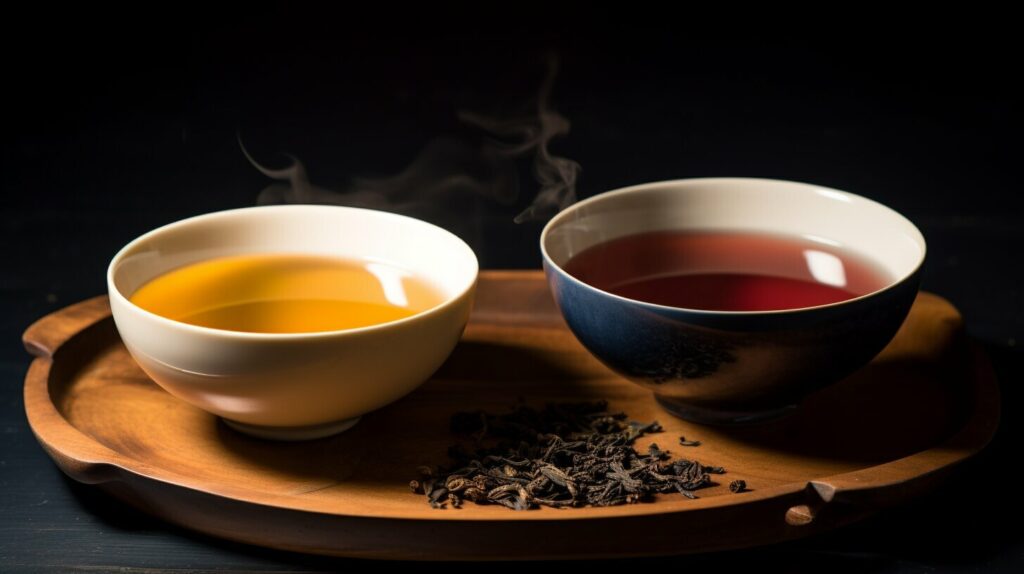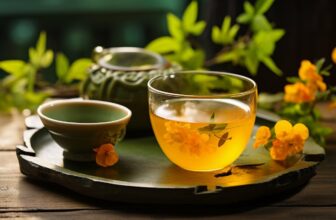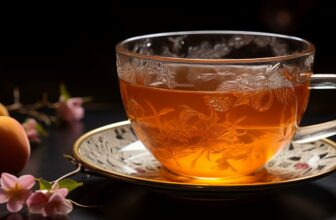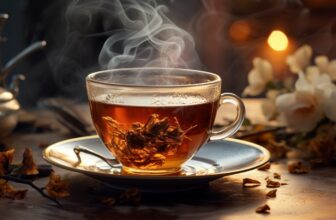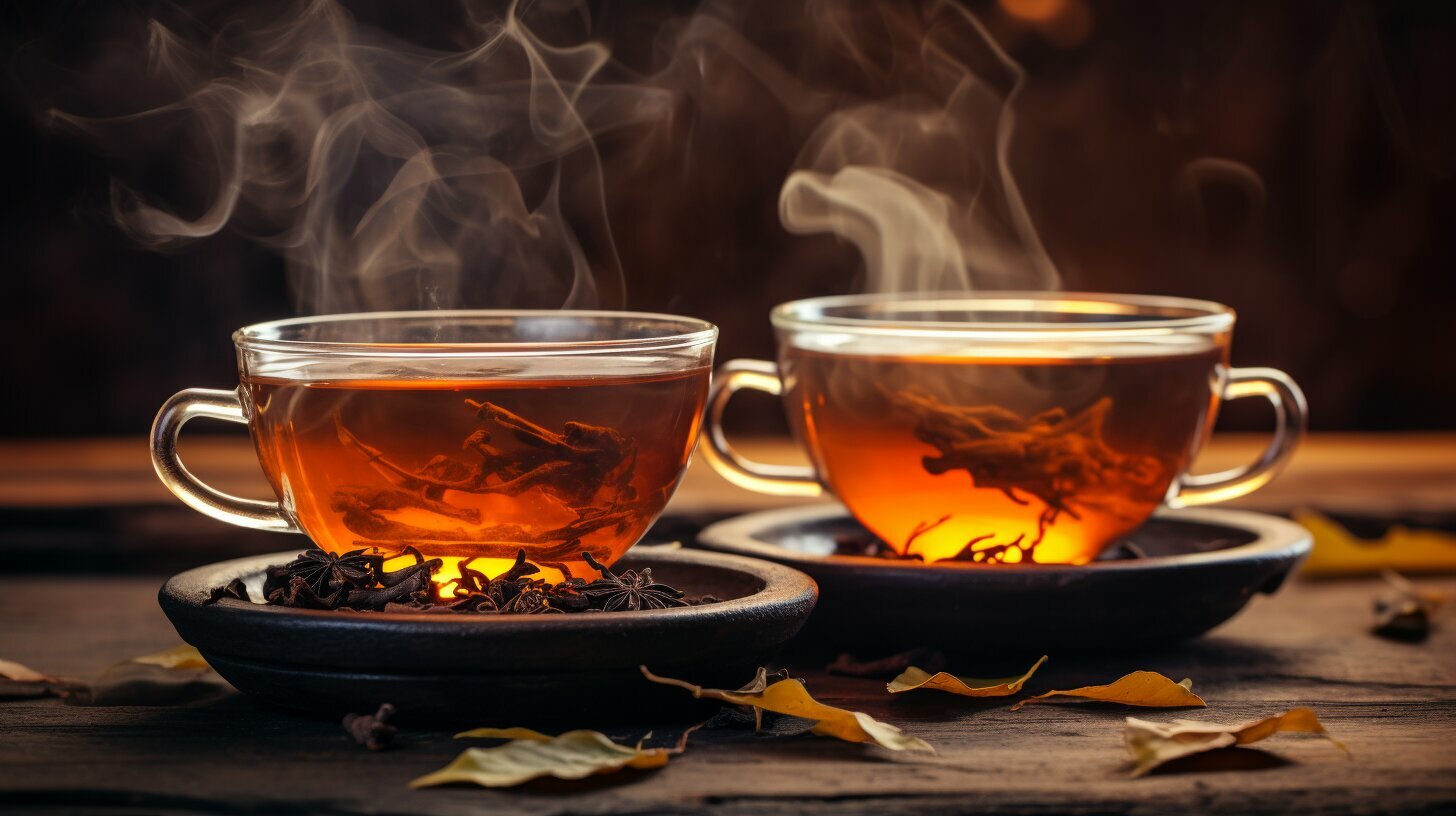
Oolong tea and black tea are two popular varieties of tea with their own unique flavors and benefits. While black tea has a bold and strong flavor, oolong tea offers a delicate yet complex taste. Both teas have their own advantages and drawbacks, making it difficult to determine which one is better. In this article, we will explore the differences between oolong tea and black tea, their health benefits, and flavor profiles to help you make an informed decision.
Key Takeaways:
- Oolong tea and black tea have distinct flavor profiles
- Black tea has a bold and robust flavor, while oolong tea is delicate and complex
- Both teas offer health benefits, such as improved heart health and weight management
- Oolong tea can aid in weight loss and black tea can help with digestion
- Choosing between oolong tea and black tea depends on personal preference and desired health benefits
Now, let’s dive deeper into the unique qualities of black tea and oolong tea, and uncover their respective health benefits, flavor profiles, and more.
What Sets Black Tea Apart?
Black tea is renowned for its bold flavor and dark color, making it a favorite among tea enthusiasts. Its rich malty taste provides a perfect morning boost or an energizing pick-me-up in the afternoon. The flavor of black tea is often described as robust, with hints of honey, caramel, and even a touch of smoke. This unique taste profile sets it apart from other teas, including its counterpart, oolong tea.
But the distinguishing factor of black tea goes beyond its flavor. Black tea also boasts a higher caffeine content compared to oolong tea, making it a go-to choice for those who seek an energy boost. The caffeine in black tea can help improve focus and mental alertness, making it a popular option for a morning or midday beverage. However, it’s worth noting that excessive consumption of caffeine may have adverse effects on individuals sensitive to its stimulant properties.
Aside from its taste and caffeine content, black tea is also known for its potential health benefits. Research suggests that black tea may aid in improving heart health by reducing the risk of heart disease and stroke. Black tea is also believed to help lower the risk of developing type 2 diabetes and support weight management. Furthermore, the presence of antioxidants in black tea contributes to its potential health-promoting properties.
The Caffeine Content of Black Tea
In the table below, you can find a comparison of the caffeine content in different types of black tea. Please note that the values listed are approximate and may vary depending on factors such as brewing time and water temperature:
| Black Tea Variety | Caffeine Content (mg per 8 oz serving) |
|---|---|
| Assam | 50-90 mg |
| Earl Grey | 30-60 mg |
| English Breakfast | 42-72 mg |
| Darjeeling | 26-60 mg |
As you can see, the caffeine content can vary depending on the specific type of black tea. It’s also important to consider that the brewing method and steeping time can influence the caffeine release. To moderate your caffeine intake, you may choose to opt for shorter steeping times or select a decaffeinated black tea option.
Overall, the bold flavor, higher caffeine content, and potential health benefits make black tea an enticing choice for tea enthusiasts. Whether you enjoy it for its taste or appreciate its potential health-promoting properties, black tea offers a unique experience that sets it apart from other varieties.
The Unique Appeal of Oolong Tea
When it comes to flavor, oolong tea offers a truly unique experience. With its delicate and complex taste, it captivates the senses and leaves a lasting impression. Oolong tea has a diverse range of flavor profiles, ranging from light and floral to dark and roasted. Each variety of oolong tea brings its own distinct notes and aromas, making it a delightful beverage for tea enthusiasts.
Some oolong teas have fruity undertones, reminiscent of peaches, apples, or citrus. Others showcase nutty flavors, like almonds or chestnuts. Some oolong teas even have floral hints, such as orchids or jasmine. The taste of oolong tea can also be influenced by the level of oxidation and the brewing technique. This versatility makes oolong tea a favorite among tea connoisseurs who seek a beverage that offers a delightful and ever-changing experience.
In addition to its intriguing flavors, oolong tea is also known for its high levels of antioxidants. These compounds help protect the body against oxidative stress and may have various health benefits. Studies have suggested that oolong tea antioxidants may play a role in reducing the risk of chronic diseases, such as heart disease, diabetes, and certain types of cancer. The combination of unique flavors and potential health benefits makes oolong tea a popular choice for those looking for a delicious and nutritious beverage.
| Benefits of Oolong Tea | Antioxidant Content | Flavor Profile |
|---|---|---|
| May reduce the risk of heart disease | Rich in antioxidants | Delicate and complex |
| Potential aid in weight management | Helps protect against oxidative stress | Notes of fruit, nuts, and flowers |
| Promotes cognitive support | May have anti-inflammatory effects | Varies depending on oxidation level |
Overall, oolong tea offers a truly unique appeal with its diverse flavor profiles and potential health benefits. Whether you prefer a light floral tea or a rich roasted variety, there is an oolong tea out there to suit your taste. So sit back, relax, and savor the complex flavors of this remarkable tea.
Comparing Health Benefits
When it comes to the health benefits of oolong tea vs black tea, both varieties offer their own unique advantages. Oolong tea has been linked to lower blood sugar levels and reduced insulin resistance, making it a potential ally in managing diabetes. It also has properties that can promote heart health by lowering blood pressure and reducing the risk of cardiovascular diseases. Additionally, oolong tea has gained popularity among those looking to lose weight, as it has been found to increase metabolism and aid in fat burning.
On the other hand, black tea has its own set of health benefits to offer. It contains compounds called theaflavins and thearubigins, which have been found to reduce bad cholesterol levels and promote heart health. Black tea is also known for its positive effects on digestion, as it can help relieve digestive issues such as bloating and constipation. This makes it a suitable choice for those seeking digestive comfort.
Here’s a comparison of the health benefits of oolong tea and black tea:
| Health Benefits | Oolong Tea | Black Tea |
|---|---|---|
| Diabetes Management | May help lower blood sugar levels and improve insulin sensitivity | May help lower blood sugar levels and reduce the risk of diabetes |
| Heart Health | Promotes heart health by lowering blood pressure and reducing the risk of cardiovascular diseases | Reduces bad cholesterol levels and supports heart health |
| Weight Management | Aids in weight loss by boosting metabolism and promoting fat burning | No significant impact on weight management |
| Digestive Health | No specific benefits for digestion | Relieves digestive issues such as bloating and constipation |
While both oolong tea and black tea have their own unique health benefits, it’s important to note that individual results may vary. It’s always best to consult with a healthcare professional before making any significant changes to your diet or lifestyle. Incorporating either oolong tea or black tea into your routine can be a delightful and flavorful way to support your overall well-being.
Flavor Profiles of Oolong and Black Tea
When it comes to flavor, both oolong tea and black tea offer a wide range of profiles that cater to different taste preferences.
Oolong tea, with its delicate yet complex taste, presents a variety of flavors that can range from light and floral to dark and roasted. One popular variety is Tie Guan Yin, which offers a green and flowery taste that is refreshing and fragrant. Another well-known oolong tea is Da Hong Pao, which presents a rich and roasted flavor with hints of minerals and a long-lasting aftertaste.
On the other hand, black tea is renowned for its bold and robust flavor. It often has notes of honey, caramel, and even smoke, making it a satisfying choice for those seeking a more intense taste experience. The flavors of black tea can vary depending on the specific type and origin, such as Assam black tea from India or Keemun black tea from China.
Whether you prefer the delicate nuances of oolong tea or the boldness of black tea, both options provide a unique and enjoyable flavor profile that can be savored with each sip. The choice ultimately comes down to personal preference and the mood you’re in.
| Tea Type | Flavor Profile |
|---|---|
| Oolong Tea | Delicate, floral, fruity, nutty, roasted |
| Black Tea | Bold, robust, malty, honey, caramel, smoky |
Conclusion
After exploring the differences between oolong tea and black tea, it is clear that determining which one is better is subjective. The debate of whether oolong tea is better than black tea comes down to personal preference, as both teas offer their own unique qualities.
Black tea is known for its bold flavor and higher caffeine content, making it a popular choice for those seeking an energizing boost. It also has its own set of health benefits, such as supporting heart health and aiding in weight management.
Oolong tea, on the other hand, offers a delicate and complex taste with a moderate caffeine content. It has a range of flavor profiles that appeal to different palates. Oolong tea also contains antioxidants and has been linked to potential health benefits, including promoting heart health and aiding in weight loss.
In the end, the choice between oolong tea and black tea is a matter of personal preference. Whether you prefer the boldness of black tea or the delicate complexities of oolong tea, both can be enjoyed as part of a healthy lifestyle. So, sit back, relax, and savor your cup of tea in the ongoing debate of oolong tea vs black tea.
FAQ
Is oolong tea better than black tea?
The choice between oolong tea and black tea depends on individual taste preferences, energy needs, and desired health benefits. Both teas offer their own unique flavors and benefits, so it ultimately comes down to personal preference.
What sets black tea apart?
Black tea has a bold and robust flavor with hints of honey, caramel, and smoke. It also contains a higher amount of caffeine compared to oolong tea, making it an energizing choice. Additionally, black tea has its own set of health benefits, including improving heart health, reducing the risk of diabetes, and promoting weight management.
What is the appeal of oolong tea?
Oolong tea offers a delicate and complex flavor profile with notes of fruit, nuts, and flowers. It has a moderate caffeine content, making it a suitable choice for those looking for a more moderate energy boost. Oolong tea also contains antioxidants that contribute to potential health benefits, such as reducing the risk of diabetes, promoting heart health, aiding in weight loss, and providing cognitive support.
What are the health benefits of oolong tea and black tea?
Oolong tea has been linked to lower blood sugar levels, reduced insulin resistance, improved heart health, and weight management. It also contains an amino acid called L-theanine, which can have cognitive effects such as improved focus, reduced stress, and better sleep quality. Black tea, on the other hand, has been associated with improved heart health, reducing triglyceride levels, lowering cholesterol, aiding in digestion, and providing a sense of comfort.
What are the flavor profiles of oolong tea?
Oolong tea offers a range of flavor profiles, from light and floral to dark and roasted. Some popular varieties of oolong tea include Tie Guan Yin, which has a green and flowery taste, and Da Hong Pao, which has a rich and roasted flavor.
What is the conclusion of the oolong tea vs black tea debate?
The debate of whether oolong tea is better than black tea ultimately comes down to personal preference. Both teas have their own distinct flavors, health benefits, and caffeine content. Whether you choose oolong tea or black tea, both can be enjoyed as part of a healthy lifestyle.


